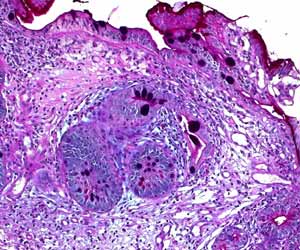- Home
- Editorial
- News
- Practice Guidelines
- Anesthesiology Guidelines
- Cancer Guidelines
- Cardiac Sciences Guidelines
- Critical Care Guidelines
- Dentistry Guidelines
- Dermatology Guidelines
- Diabetes and Endo Guidelines
- Diagnostics Guidelines
- ENT Guidelines
- Featured Practice Guidelines
- Gastroenterology Guidelines
- Geriatrics Guidelines
- Medicine Guidelines
- Nephrology Guidelines
- Neurosciences Guidelines
- Obs and Gynae Guidelines
- Ophthalmology Guidelines
- Orthopaedics Guidelines
- Paediatrics Guidelines
- Psychiatry Guidelines
- Pulmonology Guidelines
- Radiology Guidelines
- Surgery Guidelines
- Urology Guidelines
Management of gastric intestinal metaplasia-AGA guidelines

Bethesda, MD --American Gastroenterological Association has released a new clinical guideline for the management of Gastric intestinal metaplasia (GIM) which is often detected during a routine endoscopy. The new clinical guideline from the American Gastroenterological Association has been published in Gastroenterology, the official journal of the AGA Institute. It provides recommendations for the management of patients with GIM detected as part of routine upper endoscopy for reasons including workup of endoscopically identified gastropathy/presumed gastritis, dyspepsia or exclusion of Helicobacter pylori (H. pylori).
"There is wide variation in practice patterns for the management of gastric intestinal metaplasia among endoscopists in the U.S., even those caring for populations at increased risk based on their race, ethnicity or immigration status," according to Samir Gupta, MD, MSCS, AGAF, lead author of the guideline, and associate professor of clinical medicine and staff physician at the University of San Diego, CA, and Veterans Affairs San Diego Healthcare System. "AGA developed this evidence-based guideline, the first supported by a comprehensive literature review in the U.S., for the management of patients with GIM incidentally detected on gastric biopsies in to help standardize clinical practice."
Screening for gastric cancer (either population-wide or in select populations), management of patients with dysplasia of the gastric mucosa, gastric adenocarcinoma, and/or autoimmune gastritis is beyond the scope of this guideline.
The guideline recommends:
1. In patients with GIM, AGA recommends testing for H. pylori followed by eradication over no testing and eradication. (strong recommendation: moderate-quality evidence)
2. In patients with GIM, AGA suggests against routine use of endoscopic surveillance. (conditional recommendation: very low-quality evidence)
* Comments: Patients with GIM at higher risk for gastric cancer who put a high value on potential but uncertain reduction in gastric cancer mortality, and who put a low value on potential risks of surveillance endoscopies, may reasonably elect for surveillance.
3. In patients with GIM, AGA suggests against routine repeat short interval endoscopy with biopsies for the purpose of risk stratification (conditional recommendation: very low-quality evidence)
* Comments: Based on shared decision making, patients with GIM and high-risk stigmata, concerns about completeness of baseline endoscopy, and/or who are at overall increased risk for gastric cancer (racial/ethnic minorities, immigrants from regions with high gastric cancer incidence, or individuals with family history of first-degree relative with gastric cancer) may reasonably elect for repeat endoscopy within 1 year for risk stratification.
AGA recognizes that new evidence may emerge in the future that may more strongly support short-interval repeat endoscopy with biopsies for risk stratification, and/or endoscopic surveillance for gastric cancer risk reduction.
What is gastric intestinal metaplasia?
Gastric cancer is the third-leading cause of cancer death worldwide. Each year, 1,033,701 incident cases are diagnosed globally2, including 26,240 in the U.S. The majority of gastric cancers in the U.S. are non-cardia gastric cancers, arising from the antrum, incisura, body and/or fundus. Chronic infection with H. pylori is the primary risk factor for (intestinal-type) non-cardia gastric cancer, with at least 80% of the global gastric cancer burden attributable to this pathogen. Gastric intestinal metaplasia (GIM) may represent the histologic step just prior to the development of dysplasia. GIM has been considered as one specific marker to identify patients who might benefit from surveillance because it has been associated with increased risk for gastric cancer and is routinely encountered in clinical practice.
For more details click on the link: http://dx.

Disclaimer: This site is primarily intended for healthcare professionals. Any content/information on this website does not replace the advice of medical and/or health professionals and should not be construed as medical/diagnostic advice/endorsement or prescription. Use of this site is subject to our terms of use, privacy policy, advertisement policy. © 2020 Minerva Medical Treatment Pvt Ltd